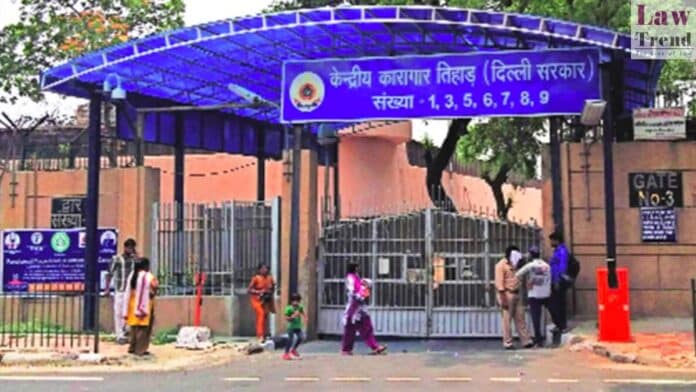Observing that a prisoner’s basic constitutional rights persist even behind bars, the Delhi High Court has constituted a four-member fact-finding committee of lawyers to “meticulously” inspect the living conditions in Tihar jail, including the status of drinking water, sanitation, overall hygiene and maintenance of washrooms in the prison complex.
While taking note of alleged lack of basic amenities in the largest prison complex in South Asia, the court remarked the right to life remains inviolable, irrespective of an individual’s incarcerated status.
“Recognising the pressing nature of this issue, we deem it necessary to authorise an independent committee for a meticulous inspection of Tihar jail. To this end, we establish a fact-finding committee consisting of Dr. Amit George, Santosh Kumar Tripathi, Nandita Rao, and Tushar Sannu.
“Their mandate is to impartially evaluate the present conditions and update us on the status of drinking water, sanitation, overall hygiene, and the maintenance of washrooms/toilets within the complex,” a bench of Chief Justice Satish Chandra Sharma and Justice Sanjeev Narula said in an order passed on August 23.
The high court was hearing a public interest litigation (PIL) filed by the Delhi High Court Legal Services Committee (DHCLSC), highlighting the pressing issue of supply of clean drinking water and maintaining hygienic sanitary conditions within the Tihar jail complex.
The petitioner drew the court’s attention to a report stemming from an inspection conducted by a panel counsel which underscored a “worrying deficiency” in providing inmates with drinking water in jail.
The plea also described the sanitary conditions there as less than satisfactory and added that many washrooms and toilets are in disrepair and even the basic privacy of inmates is compromised due to broken doors, hampering their ability to maintain personal hygiene in private.
The court noted a Delhi government representative had informed it in April that initiatives to improve basic amenities in the jail complex were underway.
However, the petitioner’s lawyer Amit George submitted a starkly different picture and argued that they have been inundated with complaints from inmates, who claim an alarming scarcity of basic necessities like clean drinking water and proper sanitation.
He contended there has been no discernible improvement in the living conditions within the jail.
“The report and accompanying photographs clearly reveal that inmates are bereft of essential amenities, including safe drinking water and functional toilets. Rule No. 425 of the Delhi Prison Rules, 2018, mandates that every inmate should have uninterrupted access to fresh drinking water at all times. These rules emphasize the importance of not only providing inmates with clean water but also ensuring a well-maintained sanitation system and washroom facilities,” the bench said.
Also Read
It referred to a judgment of the Supreme Court which said the right to life stands paramount among human rights.
“As enshrined in Article 21 of the Constitution of India, this right (to life) remains inviolable, irrespective of an individual’s incarcerated status. A prisoner’s basic constitutional rights persist, even behind bars. Therefore, any measures restricting an individual’s freedom must not infringe upon their inherent dignity and rights,” the high court said.
The high court also asked the Director General (Prisons) of Tihar jail to facilitate the committee’s work by providing all requisite resources and support to enable a thorough examination of the jail premises.
It said a detailed status report from both the committee and the Delhi government shall be filed before October 18, the next date of hearing.




